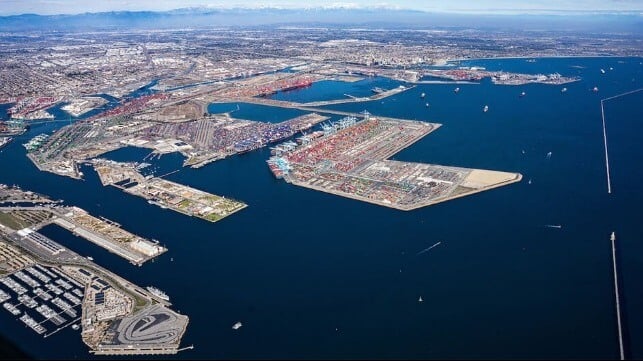Shippers Calls for Biden to Intervene to Reopen West Coast Ports

With uncertainty over how long and how wide the disruptions will be in the current labor unrest at the West Coast ports, the National Retail Federation and National Association of Manufacturers are now calling for the Biden administration to engage with the parties to help them finalize a new contract. The retail trade group earlier this year joined with more than 230 associations calling for the administration to help with negotiations and bring certainty to the ports. Fears are rising among the associations as the disruptions that started last Friday drags on and after a similar 24-hour disruption two months ago.
The public statements from the retails and manufacturing associations came as the labor action stretched into its fourth day with conflicting reports as to how widespread the impact was on operations. The Port of Los Angeles Tweeted, “Container terminals are open and operating today with appropriate staffing,” which got an immediate reply message “not normally,” saying appointments were still being canceled “due to no one working the cranes.”
One of the terminal operators at the Port of Long Beach closed for the day after reporting over the weekend that they were experiencing labor shortages. Daily employees from the union are reportedly not showing up for work with the individual terminals deciding if they will operate or in the case of Total Terminals International they told customers that they were canceling Monday morning appointments and planning to remain closed for at least part of the day. Port of Long Beach Executive Director Mario Cordero said in a statement that the port was open today, although two terminals elected to close. He expected the terminals would both reopen for Monday's evening shift.
Late on Monday, the Pacific Maritime Association representing the employers issued a follow-up statement saying that the ILWU continues to stage concerted and disruptive work actions that have slowed operations at key marine terminals at the port of Los Angeles, Long Beach, and elsewhere on the West Coast, including the port of Oakland and Seattle. "Union leaders are implementing many familiar disruption tactics from their job action playbook," writes the PMA. They cited "refusing to dispatch workers to marine terminals, slowing operations, and making unfounded health and safety claims."
Shippers have begun to speak out fearing the repercussions and the growing uncertainty around the current action.
“The United States ports, particularly those on the West Coast, play a critical role in the vitality of the American economy,” said David French, Senior Vice President of Government Relations for the NRF in a prepared statement. “Thousands of retailers and other businesses depend on smooth and efficient operations at the ports to deliver goods to consumers every day. As we enter the peak shipping season for the holidays, these additional disruptions will force retailers and other important shipping partners to continue to shift cargo away from the West Coast ports until a new labor contract is established. It is imperative that the parties return to the negotiating table. We urge the administration to mediate to ensure the parties quickly finalize a new contract without additional disruptions.”
In addition to the retailers, the National Association of Manufacturers is now calling for the Biden Administration to also get more directly involved. Jay Timmons, President and CEO of the manufacturers' association Tweeted, "Manufacturers implore the White House to bring negotiating parties together and reopen America’s shipping gateways on the West Coast."

that matters most
Get the latest maritime news delivered to your inbox daily.
The NRF had previously forecast that retailers would continue to slowly build their import volumes in the second half of 2023. Analysts have pointed to retailers' high inventory levels as one of the factors contributing to the slowdown in container volumes at the ports and U.S. imports overall.
The current disruptions at the West Coast ports come as retailers typically prepare orders and plan shipments in advance of the “return to school” retailing season and then their sales leading up to the end-of-year holidays. The Port of Los Angeles had forecast even after a labor agreement was reached it would take several months for retailers and other shippers to bring volumes back to the West Coast ports. The disruptions of the past few days, and increased uncertainty, are likely to contribute to further declines in volumes and more rerouting of shipments to the U.S. Gulf and East Coast ports.
